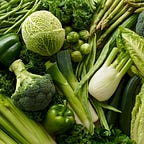Why Superfoods Are Superfluous — at Best
Why don’t we get it?
There’s no such thing as a superfood.
Sorry. That’s a stone-cold opener, right up there with a denunciation of the Easter bunny. But they’re roughly equivalent: Mythical.
There are many foods with terrific nutritional profiles: rich in valuable nutrients, free from nutritional liabilities, and either low in calories or notably satiating. Even a short list would overwhelm superfood claimants: spinach, hundreds of foods among beans and lentils; broccoli and most brassicas; chard, kale, collards and most dark greens; most berries, not just blueberries; almonds, walnuts, and most nuts; oranges, cherries, arugula, cabbage, and so on. Consider all fruits and vegetables, legumes and whole grains: It’s pretty much that simple.
Being “super” becomes super tough when you’ve got so much company. Accordingly, superfoods are pitched to us under a mystique of exoticism. The super nutrition of grocery cart mainstays is never mentioned because that would dilute the mystique. A line from The Incredibles comes to mind: No one’s special when everybody is.
Superfood claimants generally have two key characteristics: They are, for the most part, genuinely nutritious foods; and, they come from far away so that, ideally, you’ve not heard of them before: acai, or noni, or goji. As a result, whether or not they are hard to get, they are often a niche or new market, and so someone stands to make a lot of money off of them; they’re very profitable. Which, unless you’re the one selling them, should leave you cold.
But these characteristics do not create super qualities when it comes to nutrition. we’ll repeat: There are no superfoods, exotic or otherwise. The reasons are all but self-evident.
If your dietary pattern, overall, is poor, then no single food, or a few in combination, will exonerate it or immunize you. The effects of diet on health are, overwhelmingly, just that: the effects of diet on health. The most robust dietary measure of total chronic disease risk is the quality of your overall dietary pattern, not a couple of…
